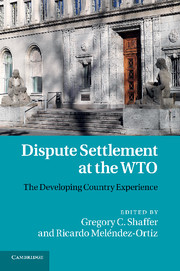Preface: The ICTSD dispute settlement project
Published online by Cambridge University Press: 07 September 2011
Summary
Gregory c. shaffer and ricardo meléndez-ortiz
This book examines dispute settlement at the World Trade Organization (WTO) from a developing country perspective. It is written largely by academics and practitioners from developing countries, and thus brings new voices to the appraisal of the WTO's dispute settlement system. The book builds from a bottom-up assessment of the challenges, experiences and strategies of nine developing countries from Africa, Asia, and South America to address the central question of how the WTO legal system, and in particular its arrangements for dispute management and resolution, could more effectively serve and advance the interests of developing countries.
Since succeeding the General Agreement on Tariffs and Trade (GATT) system in 1995, the WTO has established itself as an indispensable multilateral institution. It has instituted clear rules for multilateral exchange and a broad range of trade-related measures, and supported the development of norms in favour of open markets and predictable policies.
The WTO's dispute settlement system has been called its ‘crown jewel’. The automatic dispute settlement procedures, with their ability to authorize commercial countermeasures as sanctions, make the WTO a rare international institution. The WTO's Understanding on Rules and Procedures Governing the Settlement of Disputes (DSU) introduced substantial reforms to the old GATT system by providing defined, binding rules and procedures. The resulting rulings have reached into important areas for sustainable development, such as trade-distorting farm subsidies, resource management and the protection of public health.
- Type
- Chapter
- Information
- Dispute Settlement at the WTOThe Developing Country Experience, pp. xi - xviPublisher: Cambridge University PressPrint publication year: 2010



